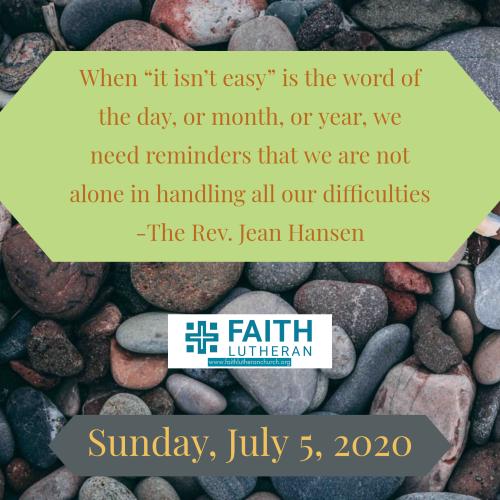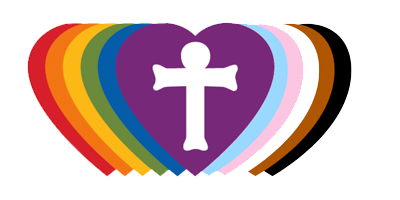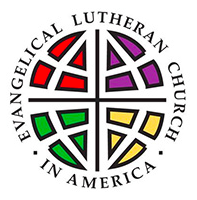
It’s Not Easy
Jul 05, 2020
Sermon 7-5-2020
Fifth Sunday after Pentecost
Text: Matthew 11:16-19, 25-30
Pastor Jean M. Hansen
The week before last I preached a sermon titled, “It’s not pretty”, in which I began by listing events that have recently impacted our lives about which we could say, “it’s not pretty.” Included were the Covid 19 pandemic and all its complications, including not only illness and death, but also economic decline and the upheaval of religious congregations like our own. Today all those challenges could be incorporated under another headline, “It’s not easy,” and we could add personal challenges of every variety, including that which is on your hearts as I pause momentarily.
To us, Jesus says, “Come to me, all you that are weary and carrying heavy burdens, and I will give you rest. Take my yoke upon you, and learn from me; for I am gentle and humble of heart, and you will find rest for your souls. For my yoke is easy, and my burden is light.”
It is a heavy time in our lives, our country and around the world. We need to hear Jesus’ comforting words, but I am not sure we can fully grasp their significance unless we put them into context, which revolves around the question, who is Jesus?
In the beginning of Matthew 11, John the Baptist, who is in prison, sends his own disciples to Jesus to ask if his cousin is the real deal. His question is, “Are you the one who is to come, or are we to wait for another?” Afterall, John’s expectations have not been met and the corrupt Romans and their Jewish minions are still in power. Jesus tells them to share with John all they have heard and seen, including the poor receiving good news and a long list of miraculous deeds. It is proof that Jesus is the one for whom they have been waiting.
As today’s reading begins, Jesus says that the problem with his detractors is they only see what they want, that which will support their criticism of him and of John. In reality, Jesus’ actions prove, as they did for imprisoned John, who he is.
So, it is that those who reject him, especially the Jewish religious leaders, who consider themselves to be smart and important, are left in the dark while those who are not considered smart and important are basking in the light. Why? It is because Jesus has chosen to reveal God’s power and presence to them. And that is why they can come to him and find rest; they know who he is, not just an itinerant preacher; he is the one who is to come, the Messiah.
No doubt those who were first invited to “come to me” by Jesus carried a variety of burdens, some that specifically fit their time and place, and others that are common to humanity. In terms of the former, they were burdened by the Jewish religious law because of how it was interpreted. For example, the religious leaders zealously enforced the law requiring giving away a portion of every spice in their kitchens yet neglected larger matters of justice and mercy. They also were burdened by Roman occupation and the loss of freedom and their homeland. On top of those big-picture burdens, they faced day-to-day struggles of acquiring food, shelter, meaningful relationships and battling illness, disability and death. It was not easy.
Jesus acknowledges all this when he says, “Come to me, all you that are weary and carrying heavy burdens, and I will give you rest.” Then he offers them his yoke. His yoke? We usually think of a yoke as a heavy bar placed across the shoulders of animals or prisoners to control them; it is a symbol of a heavy burden. But in the first century, the word “yoke” was also a metaphor for a teaching or a way of life.
So, when Jesus said, “Take my yoke upon you … for my yoke is easy and my burden is light,” he probably meant that his way of discipleship is not a burden (as was the badly interpreted Jewish law), but life-giving; to be yoked to Jesus is to be connected to the way of forgiveness, grace, hope, joy , mercy and compassion.
Given all these contextual specifics, what is the message for us? It is, first, that we are among those who are in the light, because we know who Jesus is. Second, Jesus offers us a life of faith that is grounded in grace; he frees us for an abundant life, seeped in forgiveness, in which we are empowered to love sacrificially. As one commentator noted, this is a far cry from the depiction of Christianity that offers mostly judgment and shame. (1)
And, finally, Jesus wants us to rest. This is the message we think of the most upon hearing Jesus say, “Come to me, all you who are weary and carrying heavy burdens.” Although this passage is filled with theological significance, as we’ve noted, it’s this message of comfort in the midst of day-to-day challenges that touches our hearts.
When “it isn’t easy” is the word of the day, or month, or year, we need reminders that we are not alone in handling all our difficulties; when we put on the yoke of Jesus, the burden lessens.
When I wear my stole, it is a visible reminder of putting on the yoke of Jesus, a reminder that a life of faith is grounded in grace and although there will be frustration and hardship, there also is never-ending hope and help. Perhaps it would be a good idea to start a new fashion trend in which we all wear a visible yoke of Jesus to help us remember who and whose we are.
I invite you to combine that image with another tangible one. Today I have placed a few rocks in and around our baptismal font, the place where we first put on the yoke of Jesus. (2) They represent the heaviness of our lives. What do they specifically represent for you? I invite you to reflect again on the burdens you carry. Some of these rocks are small; they are more of an annoyance than a real difficulty. Still, it’s uncomfortable to have a pebble in one’s shoe. These are the burdens of your adult children not calling for a month, or your parents continuing to go out among people in spite of your warnings that they are vulnerable to the virus. Others burdens are bigger and heavier, say perhaps the worry of financial difficulty, or an illness that temporarily slows you down, or a relationship that is not progressing as hoped. And then there are the heavy to carry, even overwhelming, burdens of an illness that cannot be treated, or loss.
As you consider those burdens, represented by these rocks, imagine each one being touched by the waters of baptism, washed in grace and hope and the Holy Spirit. As you walk away, wearing the yoke of Jesus, it’s true that the burdens are not easy to carry, but they are easier to bear.
Listen again to the words of Jesus: “Come to me, all you that are weary and carrying heavy burdens, and I will give you rest. Take my yoke upon you, and learn from me; for I am gentle and humble of heart, and you will find rest for your souls. For my yoke is easy, and my burden is light.”
AMEN
(1) “Time After Pentecost – Lectionary 14”, Sundays and Seasons, Preaching, Year A 2020, pg. 203
(2) Same as #1, pg. 205






